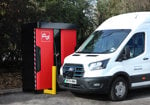A trial has shown that public electric vehicle (EV) charging can be successfully shifted to greener times of day through smart pricing, bringing down running costs for consumers without private charging access.
The Centre for Net Zero conducted the trial, revealing that dynamic pricing incentives significantly increase public charging during periods of abundant renewable electricity.
By passing on cheaper wholesale electricity prices, the study found that EV drivers without access to private charging at home can benefit from running costs that are cheaper than petrol cars.
Public EV charging can be up to 10 times more expensive than at-home charging, which the majority of EV drivers in the UK currently use.
Disparity in the availability and cost of EV charging infrastructure is a key factor inhibiting the widespread adoption of EVs, researchers say, particularly among those without off-street parking, which tends to correlate with lower income and property value.
“We’re entering the consumer era of energy, where behaviours matter as much as infrastructure,” said Lucy Yu, CEO of the Centre for Net Zero.
“Passing on grid savings to motorists in this way helps bring down their vehicle running costs and supports system stability.
“These findings offer a future where our vehicles can be a powerful tool that interacts with the grid, and can be charged smartly with cleaner, cheaper energy.
“In the future, emerging innovations such as vehicle-to-grid technology could supercharge these benefits for both consumers and the grid.”
Working in partnership with charge point operator Electroverse, the randomised control trial – Batteries on Wheels: Incentivising Smart Electric Vehicle Charging Demand in Public Settings – evaluated responses among 110,000 drivers across Britain to national ‘plunge price’ events.
These took advantage of lower wholesale electricity prices during periods of high renewable generation, passing these on to consumers as discounts at public charge points when the grid is ‘green’.
The trial successfully demonstrated that smart EV charging can be highly effective in public settings, as well as in the home.
This, researchers say, debunks a common assumption that public charging is based on driving habits that are difficult to change and instead shows that price is a central factor in influencing consumer behaviour.
As variable wind and solar production grows in the UK, they argue that incentivising cleaner, cheaper EV charging offers significant potential to lower EV running costs and support grid stability at scale.
Key findings from the study included a 40% price reduction at participating charge points led to a 117% increase in EV charging volumes across the whole charging network. A smaller 15% discount still increased charging demand by 30%.

Source:Centre for Net Zero
By contrast, non-financial nudges that highlighted cleaner grid conditions had no effect on driver charging behaviour.
Through a 40% price reduction offered two to three times a week, drivers using public charge points could potentially reduce annual running costs from 15-24p per mile to 9-14p.
This, the report says, would be on par or better than petrol costs (13-17p per mile) and narrows the gap to private EV charging rates of 2-7p per mile.
There was also a greater response from lower-income areas, on average, suggesting they may benefit more from flexibility events. This could be because these drivers are more price-sensitive, or less likely to have off-street parking.
Furthermore, regional variations were found, with the north and east of England seeing the most significant increase in charging volumes, with cities showing the greatest responsiveness to price signals.
This variation broadly aligns with the available charging infrastructure in those areas.
Impact of varying incentives on charging demand during events
Delivered in collaboration with Electroverse, Octopus Energy’s public EV charging platform, 110,000 EV drivers were randomly assigned to four groups, receiving either no message, a message that the grid was “green”, a 15% discount, or a 40% discount, during “plunge pricing” events: when wholesale electricity prices dropped due to high supply of wind or solar power.
These events generally lasted for two hours, and drivers were notified on average 18 hours in advance.
Charging costs present a barrier to EV adoption for the 40% of the UK without private driveways, with estimates suggesting that 90% of charging currently takes place at home.
Passing wholesale savings from high renewable generation to public charge points would improve EV affordability and incentivise adoption, the report claims.
By matching demand to times of high renewable supply, it also argues that smart charging can soak up excess power and ease local network pressure.
Previous research from the Centre for Net Zero found that EV flexibility could absorb over 15TWh of otherwise wasted wind and solar by 2030, more than Slovenia’s total electricity demand.
This trial, it says, provides strong evidence that drivers can deliver the flexibility required to absorb wasted renewable generation.
As a result, the Centre for Net Zero has made a series of recommendations, including reform of the electricity market.
Wholesale electricity markets, it says, must be designed to better reflect the value of energy at a specific time and location. This can then be passed onto the consumer in public and residential settings, maximising benefits to drivers and the grid.
Efforts to support demand flexibility in public charging should, it argues, also be accompanied by broader efforts to bring down costs for drivers. This includes putting VAT on par with home charging rates to alleviate the cost disparity between the two (20% VAT is added to public charging, while at-home has a 5% rate).
It is also calling for smart charging and a market-wide half hourly settlement.
To send accurate price signals that support UK drivers, it says that granular public charging data will be required.
Furthermore, as well as smart functionality, public chargers should also have smart metering.
“Smart EV charging offers a win-win for energy and transport,” said Professor Robert Metcalfe, chief economist at the Centre for Net Zero and professor at Columbia University School of International and Public Affairs.
“The data is clear: drivers respond to price signals, and even small changes in public charging costs can help consumers unlock major system benefits.
“While private charging has trialled dynamic pricing before, we have taken this innovation to the streets, producing the first research of its kind and showing a pathway to cleaner, more affordable driving infrastructure.”
Matt Davies, director of Electroverse, believes that the trial is another “powerful proof point” of the “transformative impact” renewables can have when combined with “cutting-edge tech”.
He concluded: “Price signals have unlocked dramatically cheaper bills in home energy and it’s time to do the same for public charging.
“By allowing drivers to make the most of green energy when it’s abundant, we can lower costs for millions of people who rely on public charging spots on streets, at car parks and at workplaces, making clean, affordable electric driving accessible to all.”
Building on these results, the Centre for Net Zero is conducting several further projects that can help policymakers support EV adoption and improve infrastructure access.
This includes trials to better understand the impact of EV charging, automation, and price on energy demand and the grid.
Centre for Net Zero is a nonprofit energy research and artificial intelligence (AI) institute founded in 2021 by renewable energy group Octopus Energy.
Centre for Net Zero advises, amongst others, the governments of the United Kingdom and the State of California, Europe’s International Energy Agency, the National Energy System Operator (NESO), Ofgem, the Department for Energy Security and Net Zero and the Climate Change Committee.

























Login to comment
Comments
No comments have been made yet.